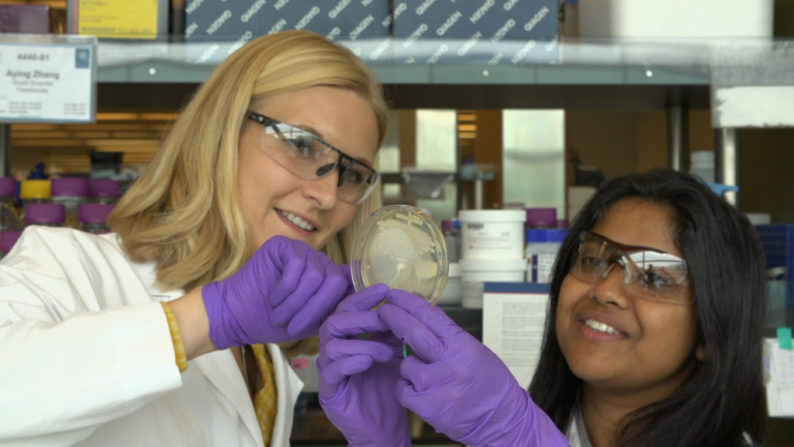-By Irina Silva
JBEI discovery leads to improved usage of the full set of sugars for biofuel
Using renewable materials to produce biofuels is an overarching goal of the U.S. Department of Energy (DOE)’s Joint BioEnergy Institute (JBEI). Plants represent this renewable source since they can be broken down to sugars such as glucose and xylose that microbes can convert to a desired final product. However, xylose utilization remains the primary bottleneck in fully using the renewable plant biomass, because the yeast S. cerevisiae, the most commonly used microbe in biotechnology, does not use five carbon sugars such as xylose for growth. As such developing ways to enable the use of xylose, the second most abundant sugar in most biomass, has been the target of intense and highly competitive research.
Aindrila Mukhopadhyay is the corresponding author for the paper entitled “Evolved hexose transporter enhances xylose uptake and glucose/xylose co-utilization in Saccharomyces cerevisiae” published in Nature Scientific Reports which reports the discovery and characterization of a yeast sugar transporter variant with superior Vmax (uptake rates) for xylose. Co-authors on this report are Amanda Reider Apel, Mario Ouellet, Heather Szmidt-Middleton and Jay D. Keasling.
The metabolic pathways to consume xylose, once imported, are fairly well established, having benefited from decades of discoveries and lab evolution, but efficient uptake into the cell has proved to be a harder target. “We obtained the variant of the yeast sugar transporter in a lab evolution experiment where we first introduced xylose metabolism genes into the yeast strain and then grew it numerous times with only xylose as a carbon source,” says Reider Apel a post-doctoral researcher in Mukhopadhyay’s Host Engineering Group at JBEI.
The experiment led to a strain that could grow solely on xylose. Though the JBEI team had not set out to find any specific mechanism, the sequence of the evolved strain revealed a single change in one of its hexose transporter (Hxt7) had bestowed this enhanced capability. Upon further characterization they found that the altered transporter also enhances glucose/xylose co-utilization, leading to a discovery that will be valuable in developing biomanufacturing strains that can use the full set of sugars generated from plant biomass.
This research was supported by the DOE Office of Science.
(Photo by Josh Cassidy/KQED)
